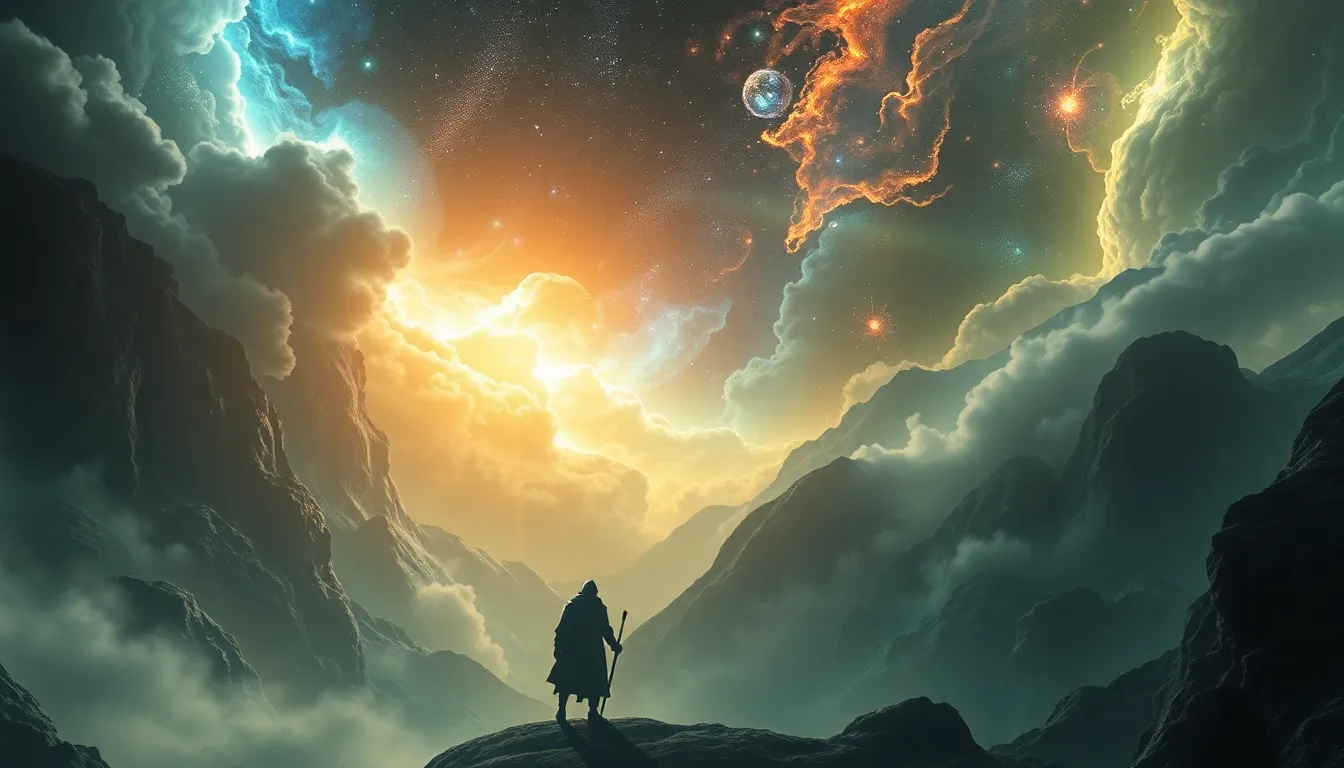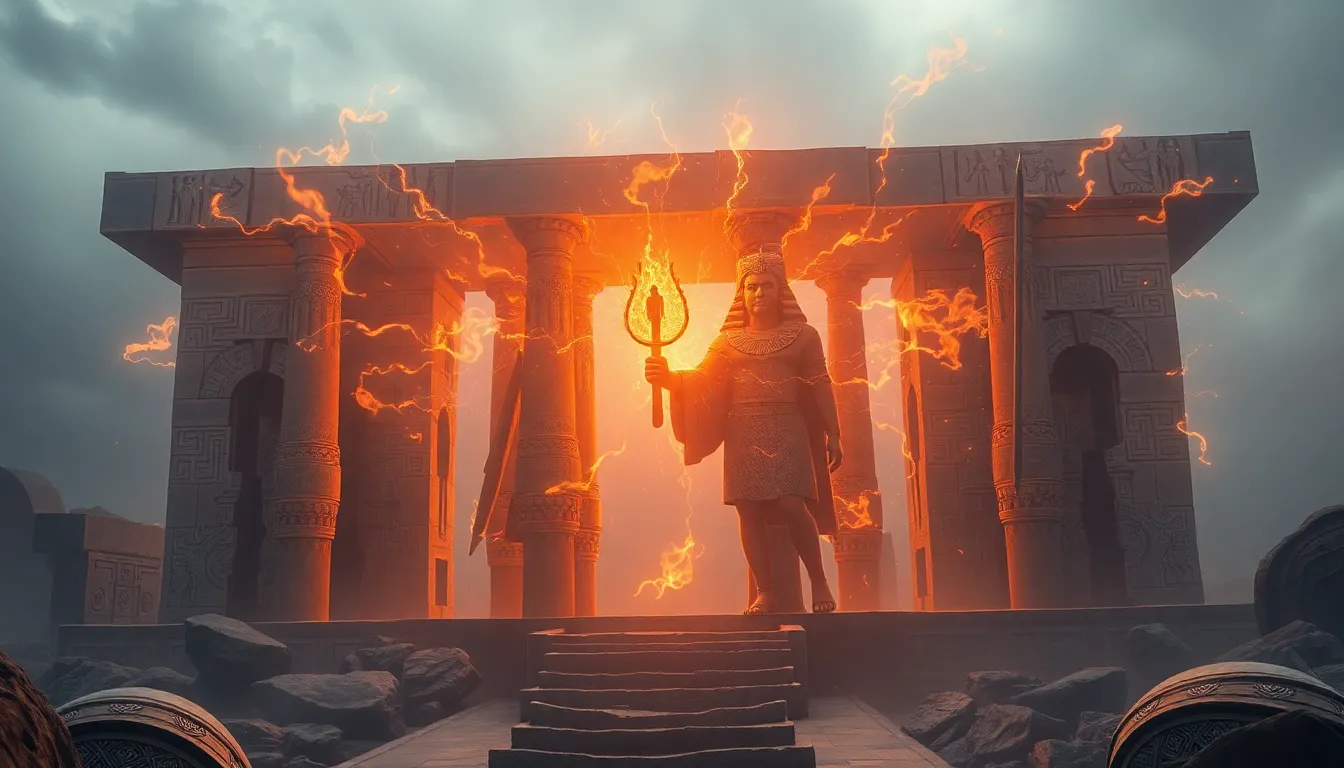The Journey of the Gods: Divine Adventures Across the Cosmos
I. Introduction
The concept of gods transcends cultures and time, weaving a rich tapestry of belief and mythology that reflects humanity’s quest for understanding the universe. From the thunderous deities of the Greeks to the cosmic cycles of Hinduism, the adventures of gods serve not only as entertainment but also as profound lessons about existence, morality, and the cosmos itself.
Divine adventures in mythology often encapsulate the struggles, triumphs, and journeys of these celestial beings as they navigate realms beyond human comprehension. This article aims to explore the cosmic journeys of various gods across different cultures, illustrating how these stories shape our understanding of the divine and our place in the universe.
II. The Origins of Cosmic Mythology
Ancient civilizations crafted intricate pantheons, each populated by gods and goddesses who governed various aspects of life and nature. These deities were often depicted as powerful beings capable of immense feats, including travel across the cosmos.
Cosmic journeys play a significant role in cultural narratives, embodying the values, fears, and aspirations of the people who tell these stories. Oral traditions have preserved these rich tales, allowing them to evolve and adapt over centuries. As such, they provide insight into how ancient societies understood the universe and their place within it.
III. The Greek Pantheon: Olympian Adventures
The Greek pantheon is replete with gods whose adventures echo through time. Key figures like Zeus, the king of the gods, and Hera, his queen, are central to many myths that involve divine travel and cosmic escapades.
- Zeus: Often depicted as wielding thunderbolts, Zeus traveled across the heavens and earth, influencing human affairs and engaging in numerous love affairs.
- Hera: As the goddess of marriage, Hera’s adventures often revolve around her efforts to protect her sanctity and confront her husband’s infidelities.
One notable myth that showcases divine travel is “The Odyssey,” where gods like Athena guide and assist the hero Odysseus on his journey home. The symbolism of the cosmos is prevalent in Greek mythology, representing order, chaos, and the human struggle for understanding.
IV. Hindu Deities and Cosmic Cycles
Hindu mythology presents a rich array of deities, each associated with cosmic principles and cycles. Major deities such as Brahma, Vishnu, and Shiva embody the forces of creation, preservation, and destruction, respectively.
The concept of Yugas, or cosmic ages, illustrates the cyclical nature of time and existence in Hindu belief. These cycles influence the divine journeys of gods, as they engage with the world to restore balance.
- Ramayana: This epic narrates the journey of Lord Rama, an incarnation of Vishnu, as he battles the demon king Ravana to rescue his wife, Sita.
- Mahabharata: This colossal saga includes the divine intervention of Krishna, who guides the Pandavas in their quest for justice and righteousness.
V. Norse Gods and the Nine Realms
Norse mythology presents a distinct cosmology, centered around Yggdrasil, the World Tree, which connects the Nine Realms. Here, gods like Odin, Thor, and Loki embark on adventures that reflect the complexities of fate and honor.
- Odin: The Allfather often travels through various realms in search of wisdom, sacrificing much for the knowledge he gains.
- Thor: Known for his strength and protection of humanity, Thor’s journeys often involve battles against giants and other threats to Asgard.
- Loki: The trickster god’s adventures are marked by chaos, often leading to both trouble and unexpected resolution.
VI. The Role of Cosmic Beings in Indigenous Mythologies
Indigenous mythologies, including those of Native American, Aboriginal, and Maori cultures, feature cosmic beings that embody the connection between nature and the universe.
These myths often illustrate creation stories and celestial journeys that emphasize the importance of balance and respect for nature. For instance:
- Native American Myths: Many tribes tell stories of the Sky Woman who fell from the heavens, symbolizing the connection between earth and the cosmos.
- Maori Myths: The story of Ranginui (Sky Father) and Papatuanuku (Earth Mother) illustrates the separation of sky and earth and the adventures of their offspring in the cosmos.
VII. The Influence of Science Fiction on Divine Narratives
Modern storytelling, particularly in science fiction, often reinterprets ancient myths, blending technology and mythology in fascinating ways. This genre explores themes of divinity and cosmic journeys in new contexts.
Examples include:
- Arthur C. Clarke’s “Childhood’s End”: The arrival of powerful alien beings draws parallels to divine intervention in human affairs.
- Marvel’s Thor: The comic and film adaptations present Norse gods as extraterrestrial beings, merging mythology with futuristic elements.
VIII. Comparative Analysis: Similarities and Differences Across Cultures
Despite the diversity of divine narratives, common themes emerge within these cosmic journeys. Many cultures share:
- Quests for knowledge and power
- Struggles against chaos and disorder
- Interactions with humanity and nature
However, unique cultural interpretations arise from geographical and historical contexts, shaping how these stories are told and understood.
IX. The Legacy of Divine Adventures in Modern Spirituality
The ancient myths continue to inspire contemporary belief systems, reflecting humanity’s enduring quest for meaning. The resurgence of interest in mythology within popular culture highlights the relevance of these stories in understanding our existence.
As society grapples with modern challenges, the lessons embedded within these divine adventures offer insights into morality, resilience, and the mysteries of the universe.
X. Conclusion
The journey of the gods across the cosmos is a testament to humanity’s imagination and longing for connection with the divine. Through the lens of mythology, we explore the intricate relationships between gods, humans, and the universe, revealing timeless truths that resonate even in today’s world. As we continue to navigate our own cosmic journey, the adventures of these divine beings remind us of the power of storytelling and the enduring nature of belief.




